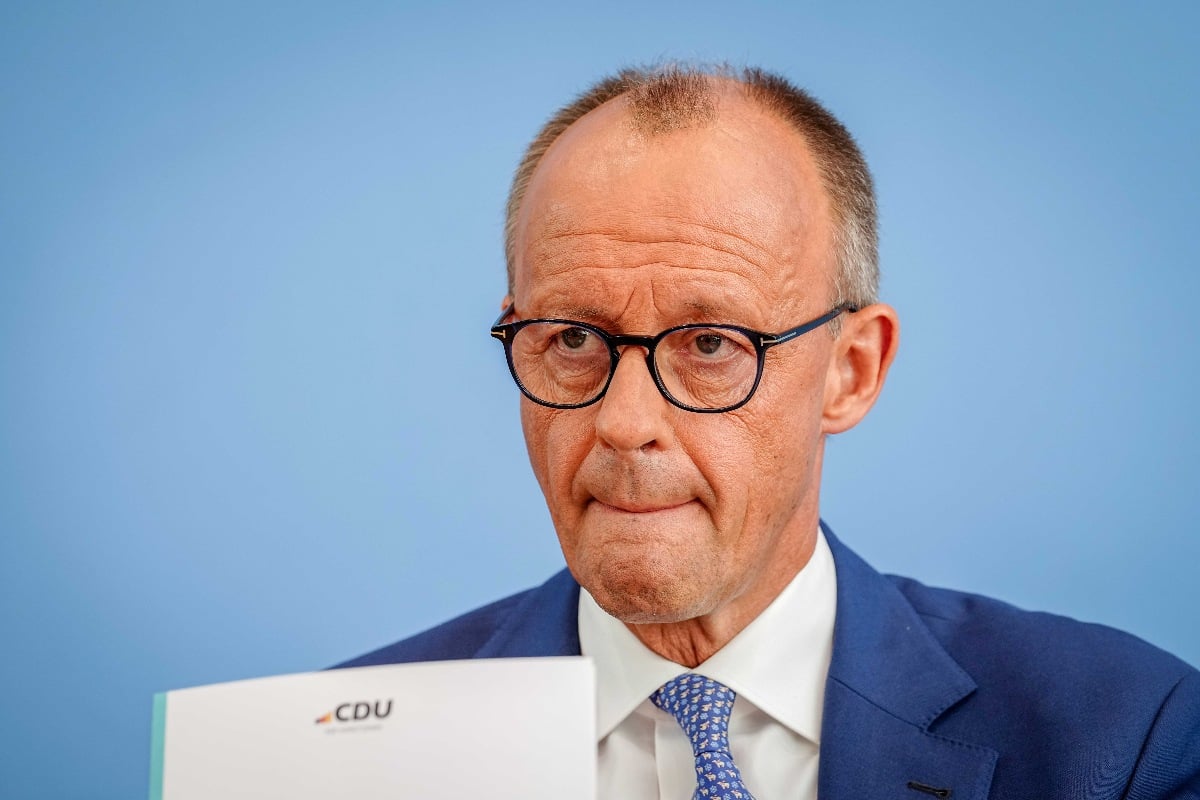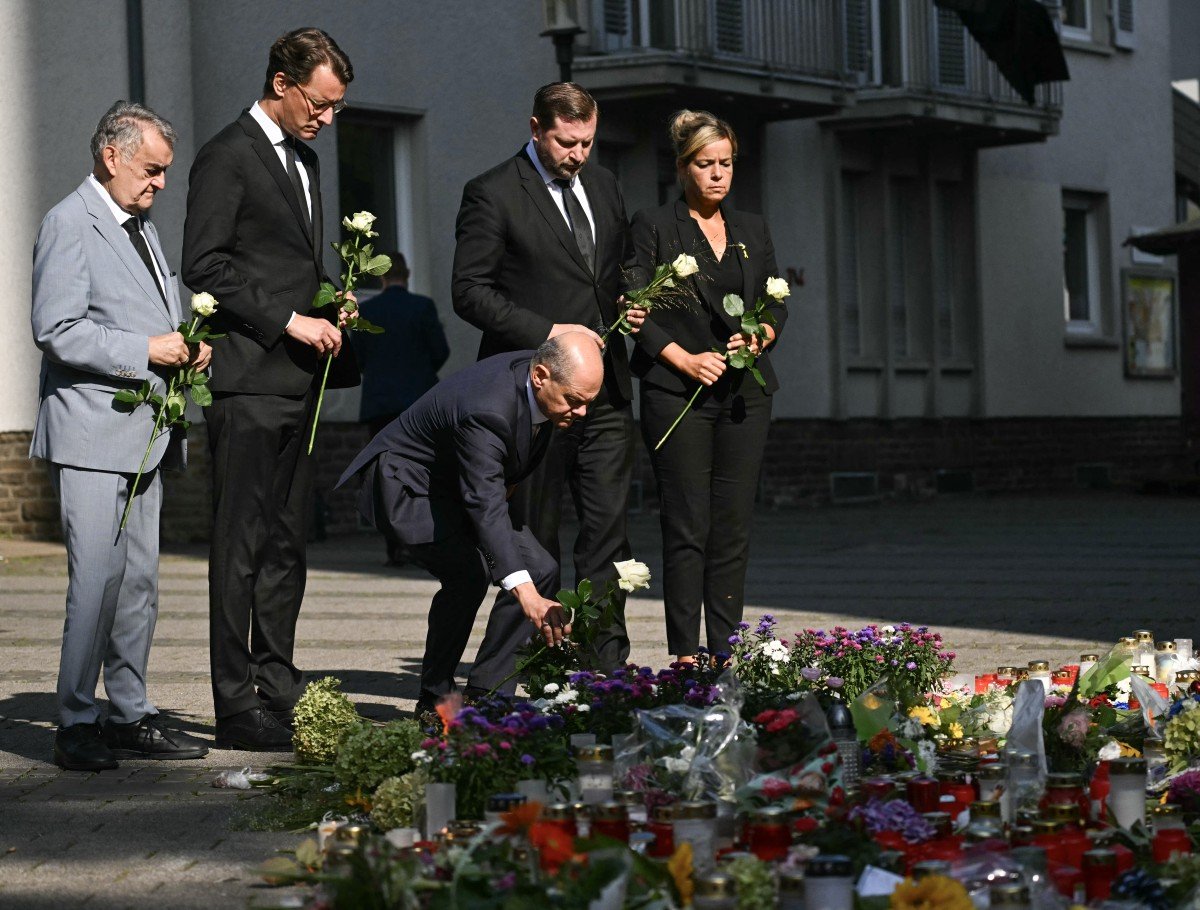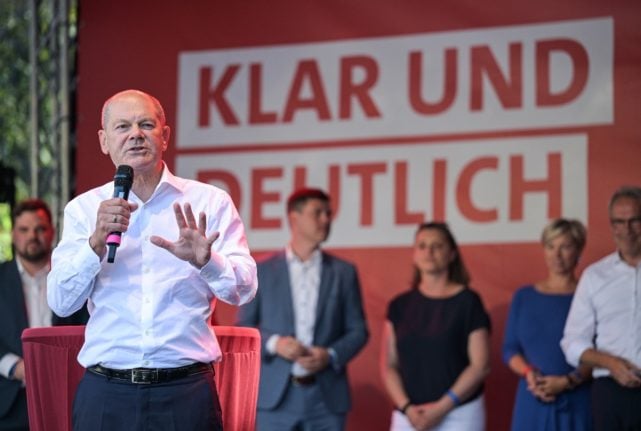Following the fatal knife attack last Friday in the western German city of Solingen allegedly by a failed Syrian asylum seeker with links to the Islamic State (IS) group, the topic of migration in Germany is reaching boiling point.
Earlier this week, German Chancellor Olaf Scholz, of the Social Democrats (SPD) pledged to tighten weapons controls and look at how to better enforce existing deportation rules.
He said his government would have to do “everything we can to ensure that those who cannot and should not stay here in Germany are repatriated and deported” and that deportations would be sped up if necessary.
READ ALSO: Scholz pledges to tighten up German weapons law ‘very quickly’
On Tuesday, Friedrich Merz, head of the centre-right Christian Democrats (CDU), the largest party in opposition to the German government, met with Scholz, in what was dubbed the ‘Solingen Summit’ by German media.
Why are leaders from opposed parties meeting?
The 70-minute long meeting between Merz and Scholz on Tuesday involved Merz piling pressure on the government to limit so-called irregular migration – that means people coming to Germany not through the usual channels like applying for and getting a visa.
Merz called for a “turning point” in what he described as Germany’s “naïve” migration policy.

After the attack, Merz demanded an end to taking in refugees from Syria and Afghanistan and called for controls on all of Germany’s borders. However, this raised questions over compatibility with German and EU law.
READ ALSO: ‘Ban asylum seekers’ – How Germany is reacting to Solingen attack
In an unexpected political move, Merz said he offered Scholz a chance to work together on revamping migration policy, even without the SPD’s other governing coalition parties, the Greens and the Free Democrats (FDP). But Merz’s apparent olive branch would potentially cause a break-up of the coalition government.
Other measures the CDU/CSU has floated include that rejected asylum seekers be immediately deported back to Syria and Afghanistan and that any refugees that travel from Germany to their home country lose their German residence status.
As well as permanent controls at the EU’s external borders, the conservatives also want to give more power to the federal police.
Merz is also controversially proposing the declaration of a “national emergency” which could override EU law, and ensure that migrants who have first travelled to another EU country are turned back at the German borders.
According to the CDU leader, Scholz did not respond to the proposal during the meeting. “He did not spontaneously express any approval,” said Merz.
What’s the reaction?
The meeting has caused an huge row and division in German politics.
Some members of the coalition say that in calling for legally questionable actions on migration reform, Merz is stirring the pot ahead of coming state elections in Thuringia and Saxony, where his CDU party in a tight race against the far-right Alternative for Germany (AfD).
At a campaign appearance on Tuesday afternoon in Jena, Thuringia, Scholz said the idea of the government and opposition working together is “never a bad thing”.
However, the chancellor was keen to stress that Germany would continue to support people who are forced to flee their country due to being persecuted.
“The individual right to asylum will be preserved. This is written in our Basic Law. And no one will question that with my support,” said Scholz on Wednesday morning to ZDF’s heute journal.
READ ALSO: Why support for the far-right AfD is set to surge in eastern Germany
Other politicians have said Merz’s tone is fuelling hate.
Parliamentary Secretary of the Green Party, Irene Mihalic told German newspaper Bild: “The leader of the largest opposition parliamentary group…is floundering instead of living up to his responsibilities.”
She said that by using language like ‘national emergency’, Merz “is to a certain extent passing a vote of no confidence in our democratic constitutional state instead of defending it against its enemies”.

Mihalic said all democratic parties should come together to develop solutions against terror.
“We are ready to talk about all constructive proposals that are compatible with the constitution, fundamental rights and human rights,” she said.
However, the tone of the debate urgently needs to change, she said, “otherwise we will end up playing into the hands of the extremist enemies of our democratic constitutional state”.
For his part, FDP leader Christian Lindner did not respond to Merz’s proposals but offered cooperation. “The FDP is ready for cross-party efforts to consistently implement new realism in migration at federal and state level,” Lindner told Bild.


 Please whitelist us to continue reading.
Please whitelist us to continue reading.
Member comments